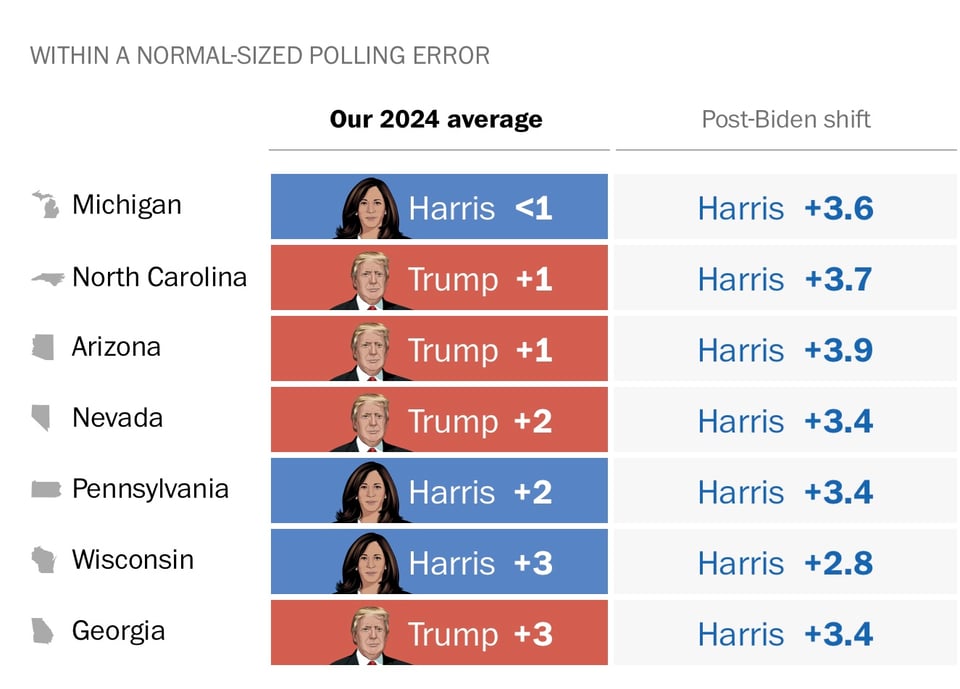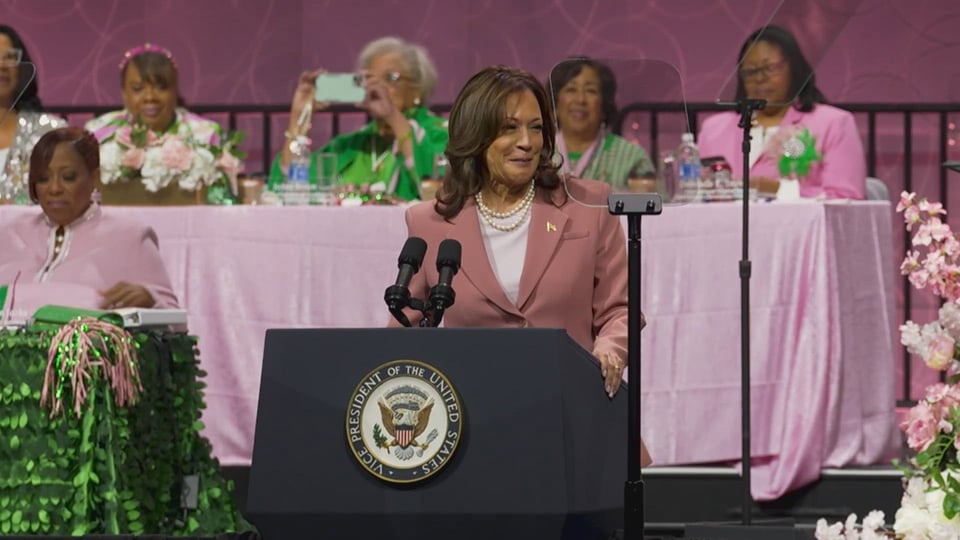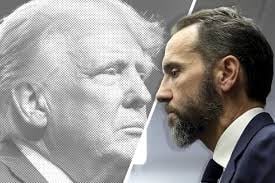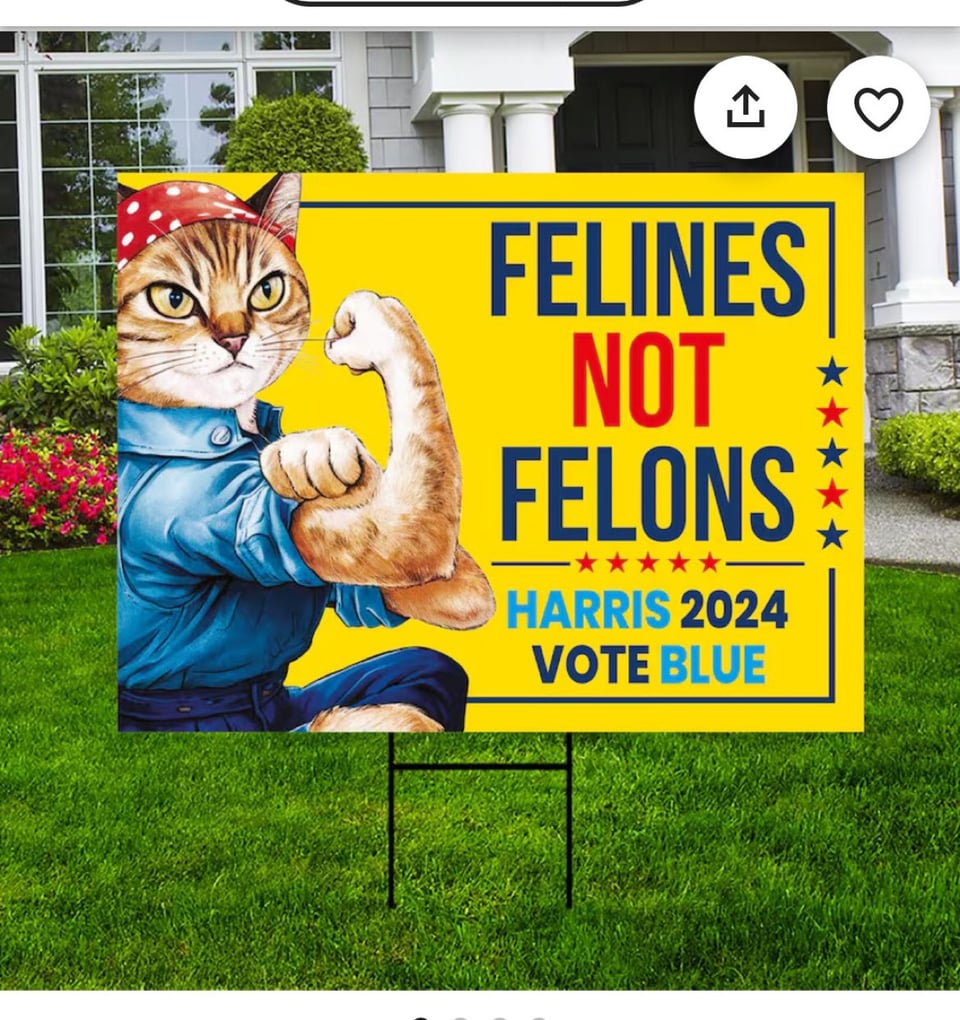Tuesday, August 27, 2024. Annette’s News Roundup.
Kamala is always busy.
She has been wooing the military. Touch to watch.👇
Presidential
— Republicans against Trump (@RpsAgainstTrump) August 24, 2024
pic.twitter.com/tEKOdGLsRt
The ads come rolling along.
1st ad.
Holy shit, Kamala’s ad is narrated by Morgan Freeman. #KamalaFightsForFreedom
— CALL TO ACTIVISM (@CalltoActivism) August 23, 2024
pic.twitter.com/HM5i4H2ANw
2nd ad.
How Kamala wins.
In case you missed it, since Joe Biden stepped down and endorsed Kamala Harris, the energy and momentum of the Election changed. And when Kamala picked her Vice President, the Harris-Walz ticket has upended the 2024 Election. The Politics of Joy has taken over.
Younger and non white voters — constituents that were previously expected either to sit out the election or to vote without enthusiasm — became engaged. And while the winner in November will come down to the 7 battleground states of Arizona, Georgia, Michigan, Nevada, North Carolina, Pennsylvania and Wisconsin, those states are clearly now in play.
Where we are now is not crystal clear. According to the Washington Post, for instance, Trump is still leading in 4 of these states but Harris-Walz are moving forward. Check out the Post-Biden shift👇.

According to the latest New York Times/Siena College Polls, Kamala is now leading Trump by 4 points in Michigan, Pennsylvania and Wisconsin. Other polls show Harris-Walz in a statistical dead heat in Georgia and Arizona.
At the moment, poll numbers don’t give us the certainty we all long for, but they do show Harris-Walz has momentum on its way to the White House.
Activism by new groups will help Harris-Walz win in 2024. 👇👇
The Divine 9 is engaging with politics in whole new way for Harris - POLITICO

CHICAGO — When Kamala Harris stepped on stage to deliver her acceptance speech Thursday night at the Democratic National Convention, she looked out on a sea of women wearing white, a homage to the women’s suffrage movement.
There were also islands of pink and green.
The colors, signaling pride for the Alpha Kappa Alpha sorority, got a shoutout on the convention stage earlier in the evening, when comedian D.L. Hughley shouted: “Where the AKAs?” prompting screams of excitement from sections of the crowd.
It was a nod to a burgeoning political force: Members of AKA and the rest of the elite Black fraternities and sororities known as the Divine Nine, who are determined to usher one of their own into the White House. Harris, who joined the sorority during her time at Howard University in the 1980s, maintains deep connections with it to this day.
AKA, the oldest Black Greek-letter organization founded by Black college-educated women, recently created its own political action committee. It’s hoping to raise money to support down-ballot candidates who are members of the sorority. The Alpha Phi Alpha fraternity, which is also part of the Divine Nine, established a $100,000 grant program for local chapters to boost voter mobilization efforts. And Delta Sigma Theta aired its first-ever get-out-the-vote ad, which aired in Chicago and Philadelphia.
“Everyone understands the assignment,” said Rep. Sydney Kamlager-Dove (D-Calif.) and a member of the Zeta Phi Beta sorority, who saw Harris speak at the sorority’s biennial boulé on her second full day as de facto nominee.
“We recognize we have, you know, less than 100 days,” she said, “and we got to propel this sister.”
The Divine Nine has a history of civic engagement and social action dating back decades that has been revitalized by Harris’ candidacy. The groups — friendly but heated rivals — have long-standing voter outreach programs, but this is the first time they’re working toward a common electoral goal.
“There is support across these nine organizations and there’s a great deal of excitement that Kamala Harris is running,” Sen. Raphael Warnock (D-Ga.), a member of Alpha Phi Alpha, told POLITICO at the DNC.
This Divine Nine now finds itself under immense pressure to ensure its turnout operations can deliver.
Recognizing that their current outreach efforts were insufficient for what is now a historically short campaign sprint, leaders with Alpha Phi Alpha scrambled to set up a meeting this month to review ways to revitalize their “A Voteless People is a Hopeless People” voter engagement program that prioritizes mobilizing Black men.
Alpha Phi Alpha officials have allocated funds for “microgrants” of $500 to $3,000 awarded to individual chapters with a history of successful voter engagement programs. They plan to focus those grants in designated regions of “Alpha South,” which include Georgia and North Carolina; “Alpha Midwest,” which includes Wisconsin and Michigan; and “Alpha East,” which is in Pennsylvania — all battleground states this cycle.
By dollars, the funds some Divine Nine political groups are spending pale in comparison to other outside spending groups trying to influence elections.
But their real power rests in sheer numbers: An estimated 2.5 million members who can mobilize an army of door-knocking and word-of-mouth operations to turn out voters in November. Divine Nine organizations issued a joint statement immediately upon Harris’ ascent to the top of the Democratic ticket, signaling they would collectively build a voter and education program they said would be “unprecedented.”
All nine presidents came to the United Center to watch Harris accept the nomination, sitting together in order of the year each organization was founded.
The fraternities and sororities are themselves nonpartisan, as are their voter mobilization efforts. But there is little doubt that such efforts will help Harris.
Harris’ long-running ties to the Divine Nine have been a large part of her public profile, even before she became the presidential nominee. She was the keynote speaker at her sorority’s boulé in Houston days before President Joe Biden ended his reelection campaign. Two days after leaping to the top of the ticket, she delivered remarks to the women of Zeta Phi Beta in Indianapolis, and she spoke a few days later at a gathering of Sigma Gamma Rho in Texas. She even eulogized Rep. Sheila Jackson Lee earlier this month as “a proud member of our beloved Alpha Kappa Alpha Sorority Incorporated, and she was a dear, dear friend.”
The Divine Nine also appeared in subtle references during her acceptance speech, when Harris name-checked Alpha Phi Alpha member Thurgood Marshall, the first Black Supreme Court justice, and honorary AKA member Constance Baker Motley, the first Black woman to serve as a federal judge. She also spoke about the possibility of passing the John Lewis Voting Rights Act, named after the late representative and civil rights icon who was a member of Phi Beta Sigma.
Harris’ team acknowledges the power of the fraternities and sororities — and the significance of her membership in the network.
“The Divine Nine has been at the inflection point of every movement in the history of our country,” said Trey Baker, senior adviser to the Harris campaign, who is himself a Kappa.
The campaign sees a direct through line to its efforts from the Civil Rights Movement, when these Black fraternities and sororities were at the forefront of spurring significant racial and legislative achievements, thanks in part to leaders like civil rights leader Martin Luther King Jr., a member of Alpha Phi Alpha; Ralph Abernathy, a member of Kappa Alpha Psi; former presidential candidate Jesse Jackson Sr., a member of Omega Psi Phi; and the late Rep. John Lewis, a member of Phi Beta Sigma.
“It’s because the Divine Nine does the work, has the type of membership that it has, believes in leadership and service and community, that those people will naturally be a part of the ecosystem of this,” Baker added.
The aim of all this, said Willis Lonzer III, the general president of Alpha Phi Alpha fraternity, is “to make sure that we’re effective in doing the things that we need to do to mobilize voters and get them to the polls.”
Many of the Divine Nine leaders said they have other plans in the works to capitalize on the excitement in the race.
Officials with Delta Sigma Theta, for instance, hope the renewed interest in the presidential election will also return much-needed attention to expanding voting rights. Deltas are on track to train some 30,000 members on ways to promote social action and have partnered with the NAACP Legal Defense Fund to train 500 lawyers to monitor polling centers on Election Day.
And both organizations were part of a coalition of national organizations that filed a series of lawsuits fighting Texas and Georgia laws that restricted access to the ballot after the 2020 election.
Rhonda Briggins, President of Delta for Women in Action, said she is hoping to raise $1 million before the election to help candidates in local races in North Carolina, South Carolina and Indiana who were selected for its Chisholm Jordan Institute, a program that trains Black women to run for office, named after Shirley Chisholm, the first Black woman to pursue a presidential bid, and Barbara Jordan, the first Black woman elected to Congress from Texas.
“These types of groups have been doing this type of work and organizing around a host of issues,” said Warnock, the Georgia Senator. “And this just gives them one more historic chance to make a real difference in the world.” (Politico).
400,000 volunteers in GA.
BREAKING: New reporting shows that Kamala Harris has amassed over 400,000 volunteers in Georgia. That means more than 4% of Georgia’s population is volunteering for Kamala Harris’ campaign. Wow.
— Kamala’s Wins (@harris_wins) August 25, 2024
The campaign also said that during convention week, supporters signed up for nearly 200,000 volunteer shifts to help the campaign.
“Momentum is shifting. People are fired up, and I've seen it all across Pennsylvania," Pennsylvania Lt. Gov. Austin Davis said. "For the next 81 days [now 70 days],I don't think this momentum is going to stop. This train's going to keep on moving." (CBS News).
The Vice President and Her Running Mate will tour Georgia on Thursday.
Worth repeating.
Michelle Obama- do something!
Donate. Volunteer. Work on Voter Registration. Grab friends and make voting plans.Share this Roundup to your friends and social media.
One more thing.
At the end of the DNC, Vice President Kamala Harris’ campaign said, during Convention Week, it has raised $540 million for the election (PBS).
Bobby Kennedy, Jr., continuing his strange, erratic behavior, has ended his Presidential run and endorsed Donald Trump.
His family has made clear how pathetic they find this. 👇
I am sharing a personal statement that my family and I have made in response to my brother’s announcement. pic.twitter.com/j7vTTabNYZ
— Kerry Kennedy (@KerryKennedyRFK) August 23, 2024
Watch Bobby Kennedy’s sister, Kerry Kennedy talk about her brother with Jen Psaki.👇
Kerry Kennedy: I am disgusted by my brother’s obscene embrace of Donald Trump. And I completely disavow and dissociate myself from Robert Kennedy Jr. and his flagrant efforts to desecrate my father's memory. pic.twitter.com/iW8pmRQRdn
— Acyn (@Acyn) August 25, 2024
Former Republican Congressman Adam Kinzinger continues to troll Trump.
If Donald Trump had been on the titanic, he would have been scrambling to find women’s clothing to put on and escape before everyone else
— Adam Kinzinger (Slava Ukraini) 🇺🇸🇺🇦🇮🇱 (@AdamKinzinger) August 25, 2024
The big news on Monday.
Prosecutors Appeal Dismissal of Trump Classified Documents Case.

The special counsel, Jack Smith, argued that Judge Aileen Cannon had erred in throwing out charges against Donald Trump of improperly holding national security secrets after leaving office.
Federal prosecutors began their bid to resurrect the moribund classified documents case against former President Donald J. Trump on Monday, telling an appeals court in Atlanta that the trial judge had improperly thrown out the charges.
In a filing to the U.S. Court of Appeals for the 11th Circuit, the prosecutors argued that the judge, Aileen M. Cannon, erred last month when she handed down a bombshell ruling that dismissed the case on the grounds that Jack Smith, the special counsel who brought it, had been appointed to his job illegally.
The ruling by Judge Cannon, who was placed on the bench by Mr. Trump, stunned many legal experts for the way that it upended 25 years of Justice Department practice and flew in the face of previous court decisions about the appointments of special prosecutors reaching back to the Watergate era.
Issued on the first day of the Republican National Convention, where Mr. Trump formally accepted his party’s presidential nomination, Judge Cannon’s ruling also gave him a major legal victory at an auspicious political moment.
Mr. Smith’s appellate brief on Monday was merely the start of a legal battle that may end up at the Supreme Court and is likely to drag on until well after the election in November.
Should Mr. Trump win the election, he would have the power to fire Mr. Smith and could order the Justice Department to drop the appeal. Should he lose, the appeals process will determine whether he can still go to trial on the charges.
In their filing, Mr. Smith’s deputies told a three-judge panel of the appeals court that Judge Cannon had committed an error when she ruled that no specific federal statute authorized the appointment of special counsels like Mr. Smith or gave them the “prosecutorial power” that they have wielded for 25 years. The prosecutors pointed to four current statutes that they believe give the attorney general the authority to name special counsels.
“The district court’s contrary view conflicts with an otherwise unbroken course of decisions, including by the Supreme Court, that the attorney general has such authority,” the prosecutors wrote, “and it is at odds with widespread and longstanding appointment practices in the Department of Justice and across the government.”
The classified documents case, which was being heard in Federal District Court in Fort Pierce, Fla., before Judge Cannon threw it out, had once seemed to be the most straightforward of the four criminal prosecutions Mr. Trump has faced in the past two years.
He was charged in June of last year with illegally holding on to a trove of classified national security materials after leaving office and then obstructing government efforts to retrieve them along with two co-defendants, Walt Nauta and Carlos De Oliveira, who worked for him at Mar-a-Lago, his private club and residence in Florida.
Since 1999, the appointment of special counsels has been governed by internal Justice Department regulations traditionally believed to have been based on at least four federal laws laying out the structure of the department and the powers of the attorney general.
That practice was adopted after Congress permitted the Independent Counsel Act, a law that specifically authorized and governed a different type of independent prosecutor, to lapse after the Whitewater investigation into President Bill Clinton.
But Judge Cannon rejected that tradition, ruling that none of the statutes governing the conduct of attorneys general actually gave them the authority to appoint special prosecutors like Mr. Smith. She also found that Mr. Smith’s appointment was illegal because he had not been named by the president and confirmed by the Senate.
Prosecutors with some measure of independence from the federal officials who appoint them have long been used to conduct sensitive political investigations. The practice reaches back to the days when the Confederate leader, Jefferson Davis, was charged with seditious conspiracy after the Civil War, Mr. Smith’s deputies reminded the appeals court.
The prosecutors claimed that Judge Cannon had “erroneously disregarded this history as ‘spotty’ or ‘ad hoc’” and paid too much attention to the minor iterations in the rules that have governed independent prosecutors over the decades.
Mr. Smith’s team also expressed concern that Judge Cannon’s refusal to recognize the validity of the way in which he got his job could “call into question hundreds of appointments throughout the executive branch.” And that, they wrote, “could jeopardize the longstanding operation of the Justice Department.”
Judge Cannon based her decision to toss out the documents case on the appointments clause of the Constitution. The clause requires presidential nomination and Senate confirmation for all principal officers of the government, but allows so-called “inferior officers” to be put in place by leaders of federal departments, including the attorney general, under the guidance of specific laws.
Mr. Smith’s deputies told the appeals court that Judge Cannon had made a mistake when she found that there were no laws that specifically authorized Attorney General Merrick B. Garland to name Mr. Smith to the post of special counsel in November 2022. Mr. Smith was given the job of investigating allegations that Mr. Trump had illegally held on to classified documents after leaving office and separate accusations that he had plotted to overturn the 2020 election.
In seeking to persuade the appeals court, Mr. Smith’s team pointed primarily to a Supreme Court case, United States v. Nixon, which found that the attorney general had the statutory power to appoint a special prosecutor to investigate the Watergate scandal in the early 1970s.
In her dismissal order, Judge Cannon took the position that the Supreme Court’s finding about the Watergate special counsel was a “nonbinding” aspect of the ruling, which largely focused on the separate issue of whether President Richard M. Nixon had to comply with a subpoena in the broader inquiry.
While the appellate brief by Mr. Smith’s team was chiefly designed to bring back the criminal charges against Mr. Trump, it also looked beyond the classified documents case to the long-term health of the Justice Department. Prosecutors worried that there could be devastating consequences to the department if Judge Cannon’s findings were left unchallenged.
“If the attorney general lacks the power to appoint inferior officers,” they wrote, “that conclusion would invalidate the appointment of every member of the department who exercises significant authority and occupies a continuing office, other than the few that are specifically identified in statute.” (New York Times).
Returning to . . .
Your Daily Reminder.
Trump is a convicted felon.
On May 30th, he was found guilty on 34 felony counts by the unanimous vote of 12 ordinary citizens.
The Convicted Felon Donald J. Trump was scheduled to be sentenced on July 11. He will now be sentenced sometime around September 18th.

Yesterday was Women’s Equality Day.
The Vice President sent us all a message. Pass it on.
Women’s Equality Day marks a monumental step forward in expanding voting rights.
— Kamala Harris (@KamalaHarris) August 26, 2024
The best way to honor the generations of women who paved the way is to vote and protect our reproductive freedoms at the ballot box.
Make sure you’re registered at https://t.co/VbrfuqW5Zn.